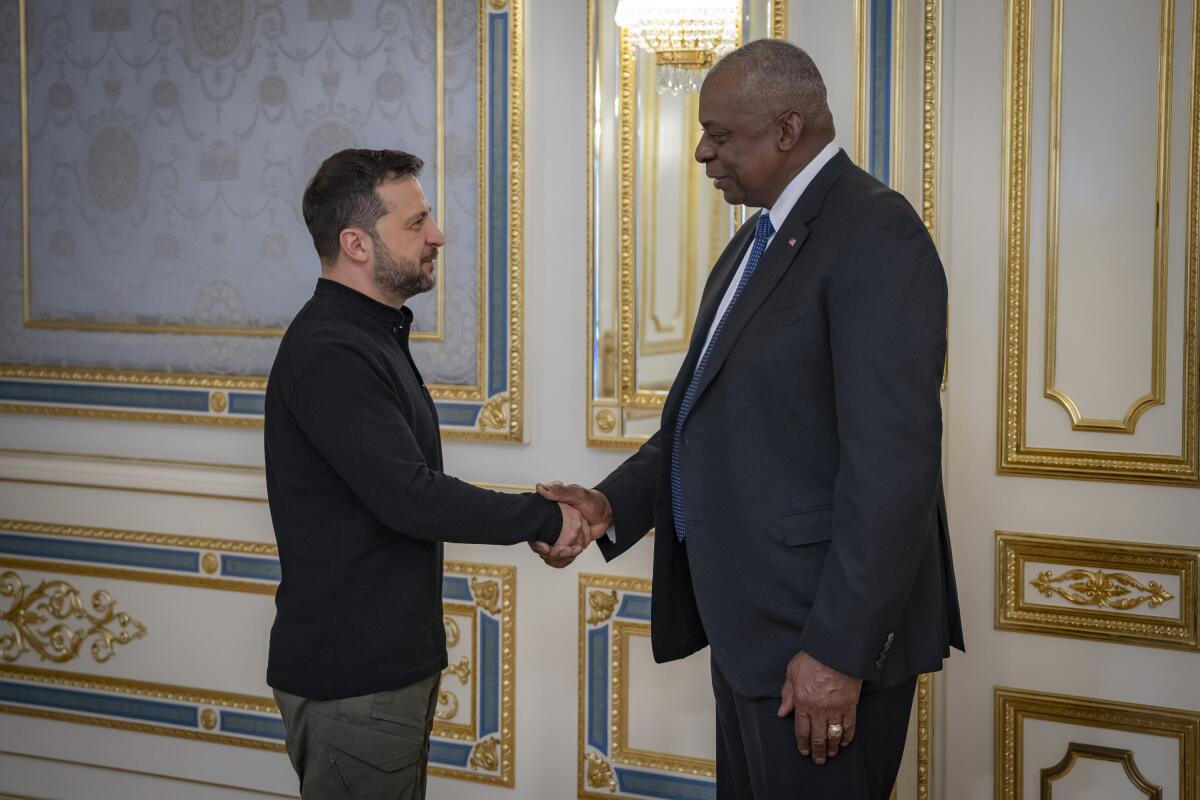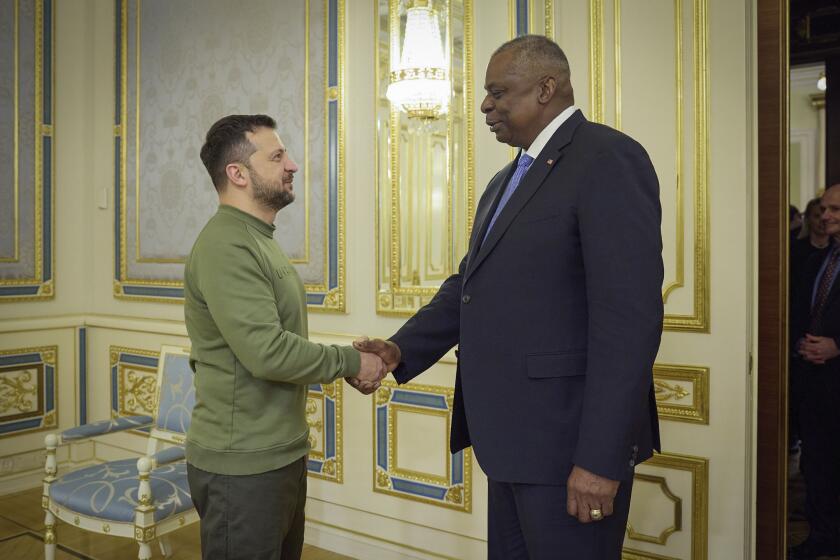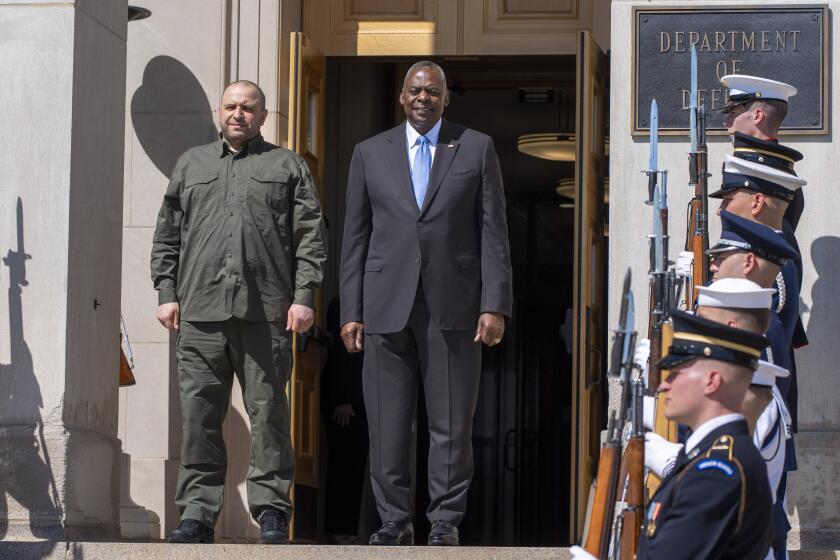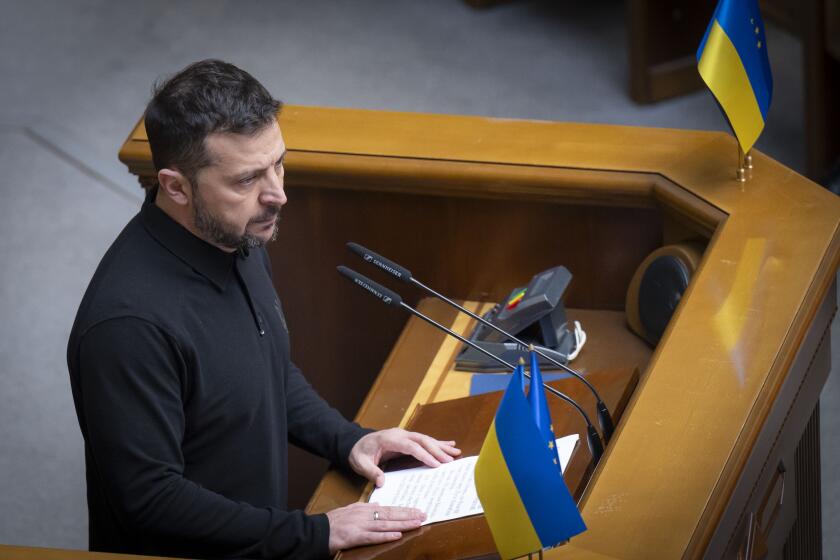U.S. Defense chief promises Ukraine what it needs to fight Russia but goes no further

- Share via
KYIV, Ukraine — The United States “will get Ukraine what it needs” to fight its war with Russia, U.S. Defense Secretary Lloyd J. Austin III said on an unannounced visit to Kyiv on Monday, but he gave no hint that Washington might endorse key planks of Ukrainian President Volodymyr Zelensky’s so-called “victory plan.”
The United States will provide Ukraine with what it requires “to fight for its survival and security,” Austin said in a speech at the Diplomatic Academy of Ukraine. He noted that the U.S. has delivered more than $58 billion in security assistance for Ukraine since Russia’s February 2022 full-scale invasion, making it Kyiv’s main backer.
That includes a new $400-million package of military aid that the Biden administration announced Monday, including munitions for rocket systems and artillery, mortar systems and rounds, armored vehicles and anti-tank weapons. It comes just days after the U.S. said it was sending $425 million in military assistance to Ukraine.
Defense Secretary Lloyd J. Austin III reassures President Volodymyr Zelensky in Kyiv that U.S. support for Ukraine’s fight against Russia is ‘for the long haul.’
But Zelensky has asked Ukraine’s Western allies to go a few steps further, notably inviting Ukraine to join NATO and letting it use Western-supplied longer-range missiles to strike military targets deep inside Russian territory. Those steps have met with a lukewarm response.
Ukraine is having difficulty holding back a ferocious Russian campaign along the eastern front that is gradually compelling Kyiv’s forces to give up a series of towns, villages and hamlets. It faces a hard winter after Russia targeted its power grid.
Austin’s remarks were notable for what they did not include — an endorsement of Ukraine being invited into NATO, or any indication the U.S. will support Ukraine becoming more aggressive in its defense with longer-range attacks on Russian soil.
With the U.S. presidential election about two weeks away, U.S. officials are treading carefully. President Biden has balked at measures that might escalate the war and bring a confrontation between NATO and Russia.
The additional security assistance for Ukraine would include antitank weapons, interceptors and munitions for Patriot and other air defense systems.
Austin said, “There is no silver bullet. No single capability will turn the tide. No one system will end Putin’s assault.”
He added: “Make no mistake. The United States does not seek war with Russia.”
“What matters is the way that Ukraine fights back,” Austin told the assembled diplomatic and military personnel at the academy. “What matters is the combined effects of your military capabilities. And what matters is staying focused on what works.”
Zelensky said in a Sunday evening video address that his “victory plan” had won the backing of France, Lithuania, Nordic countries and “many other allies” in the European Union, which he didn’t name.
Zelensky said he had received “very positive signals from the United States,” but he stopped short of saying he had secured Washington’s blessing for the plan.
Major points of the plan include permission to use Western-supplied longer-range missiles to strike military targets deep inside Russian territory.
Analysts say the U.S. is unlikely to make a decision before the Nov. 5 presidential election.
The latest Russian strikes on Ukraine, targeting Kyiv, Odesa and Zaporizhzhia, rammed home the urgency for Kyiv officials of clinching guarantees of more support, particularly large amounts of ammunition for the war of attrition the sides are engaged in.
A Russian missile attack on the southern city of Zaporizhzhia killed two people and injured 15 in the city center and caused huge damage to civilian infrastructure, including a kindergarten and more than 30 residential buildings, regional Gov. Ivan Fedorov said.
Russia conducted a ballistic missile strike at Kryvyi Rih, Zelensky’s hometown, injuring five people, city administration head Oleksandr Vilkul wrote on social media.
According to Vilkul, Russia has conducted ballistic missile attacks on Kryvyi Rih for three consecutive days, injuring the total of 21 people and damaging dozens of residential buildings and civilian infrastructure.
President Biden and British Prime Minister Keir Starmer are to meet Friday amid signs the two are more receptive to allowing the Ukrainians to use their arms to hit targets farther inside Russia.
Machine gunfire and the noise of drones’ engines was also heard in Kyiv’s center throughout the night. Authorities reported minor damages to civilian infrastructure caused by falling drone debris in three districts.
Russia fired three missiles and more than 100 drones at Ukraine overnight from Sunday to Monday, Ukraine’s air force said.
Meanwhile, Ukraine’s Foreign Minister Andrii Sybiha met with his Turkish counterpart, Hakan Fidan, in Ankara on Monday to discuss cooperation between their countries.
According to Ukraine’s Foreign Ministry, the meeting focused on strengthening strategic relations, defense cooperation and addressing global food security through Black Sea grain shipments from Ukraine that pass through Turkey’s Bosphorus Strait.
Turkish President Recep Tayyip Erdogan has sought to steer a balanced line in his NATO-member country’s close relations with both Ukraine and Russia. He has previously offered to host a peace summit between the two countries.
Novikov writes for the Associated Press. AP writer Tara Copp in Washington contributed.
More to Read
Sign up for Essential California
The most important California stories and recommendations in your inbox every morning.
You may occasionally receive promotional content from the Los Angeles Times.














